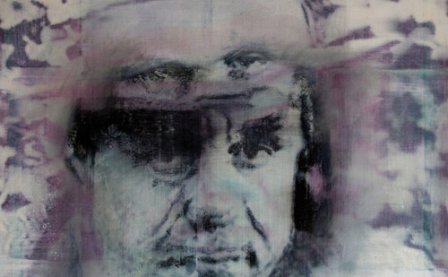In the aftermath of Black To Comm’s latest, two quotes jump out from this interview with Ho Tzu Nyen, the Singaporean artist whose video installation, Earth (((radio))), it soundtracks.
First quote: “Sampling — reviving things from the past — is a kind of zombie activity. There’s a vague nostalgia about it but also a sense of decay.”
Second quote (this one is more a fragment of speech): “the instability of all beginnings.”
First quote. Marc Richter, the organizing presence behind this oddball orchestra of wailing bowls and singing saws, has made Marclayan sport of his use of shellac fizz as a centrifugal timbre. There’s nostalgia there, but what makes it vague is that automatic/self-generative purposelessness at the heart of any timbral process. Crackle for the sake of crackle; hiss for the sake of hiss. This isn’t a nostalgia that would seek to restore lost meanings to a dilapidated context, its nostalgia for any context beyond the moment. Whence the sense of decay: what recorded sound and video share is their character as traces left behind by the disappearance of everything else (a sample is a box with nothing in it). Within this disappearance, one can discern the origin of illusion — reality’s narcissistic, sewer-wet twin.
Which brings us to the parallax sweep of soundtracking: if Ho generates illusions with video (in order to reimagine the history of art), Richter moves in the opposite direction, using illusions to remake video. In that sense, Earth is less a score (servile to incident) than a piece of library music whose commission is readymade: the absence of video is reinforced, piecemeal, by the rustle of its detail. Earth is a mirror of Earth (((radio))); it is also a portal. This pairing of two singularities mutually replenishes their core illusion, which is the common thread uniting two entities that otherwise lack resemblance.
That illusion, then. A vegetative slump — the shadows of the cosmos lengthen — a gibbous biomass awakens. Like Clark Ashton Smith’s Hyperborean deity Abhoth, a living pool of phosphorescent matter, it sprawls like a septic contagion. Its mouths are David Aird (a.k.a. Mordant Music’s Vindicatrix), a shamanistic gibber the colour of dread, a striking performance that has you scrabbling around in James Parker’s Laurel Halo review, wondering if there’s anything about the voice that has been left unsaid. Its limbs are the players — Zuydervelt on bowls; Kline on saw; Nikolaus and Richter on everything else (a nebulous arsenal of strings and winds: plucked, honked, and discarded). Its pith remains that granular crackle, a low-level ambient murmur that stands in for silence.
We’re back to that second quote. Earth’s greatest strength is also its structural weakness; to continually enact the tremulousness of all origins is to refuse to get going, to depart. So when closing track “Mirror” breaks out into something like a rhythmic clomp, it represents a moment of collapse. Lift-off becomes retreat; this mutant sensuousness loses its spectral intensity. In the four tracks that precede it, a formless psychedelia writhes: an immanent ecstasy bobbles like gooseflesh.
More about: Black to Comm




